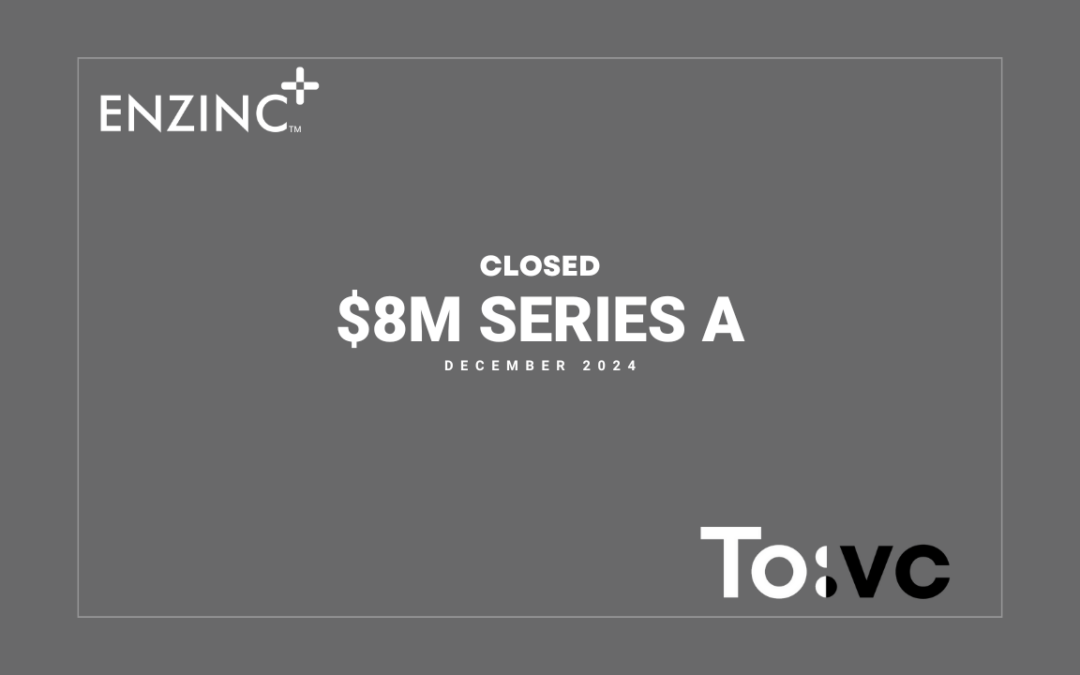
by Enzinc Marketing | Dec 11, 2024 | Press Release
Funding round led by TO VC funding will accelerate commercialization of Enzinc’s revolutionary zinc-based battery technology
RICHMOND, Calif. – 11 December, 2024 – Enzinc Inc., an advanced zinc battery developer, today announced it had closed its Series A funding, raising $8 million. The round was led by TO VC, with participation from American Century Investments (ACI), which led Enzinc’s seed round.
The funding comes as global demand for batteries skyrockets and the world searches for alternatives to lithium-ion chemistry. Enzinc’s proprietary technology unleashes zinc’s full potential, creating rechargeable advanced nickel-zinc batteries with high energy density and unparalleled safety.
Enzinc’s technology enables its customers—lead-acid battery manufacturers—to leverage the existing 400GWh of global manufacturing capacity to make high-performance batteries without a massive capital investment. They can triple their output and boost revenue and margins while meeting the growing demand for efficient batteries for mobility and stationary uses.
“There’s a vast untapped resource in the global lead-acid manufacturing infrastructure and Enzinc is poised to unlock this potential,” said Joshua Phitoussi, cofounder and managing partner at TO VC. “The US can leverage its global leadership in lead-acid battery manufacturing capacity to position itself as a leader in advanced battery manufacturing without investing many billions of dollars in gigascale factories. We invest in companies that are building earth’s most vital ventures, and energy storage is one of the most powerful areas of innovation to get to net zero greenhouse gas emissions. Enzinc’s technology unlocks the ability to transform these existing factories into powerhouses for advanced batteries.”
TO VC focuses on early-stage startups with transformative technologies in energy systems, food systems, and carbon removal. Known for its active partnership with founders, TO VC has a track record of nurturing companies from concept to market leadership.
“Securing this funding in today’s challenging environment is a testament to the confidence our investors have in Enzinc’s vision and ability to scale our safe and powerful battery technology rapidly,” said Michael Burz, CEO and cofounder of Enzinc. “We appreciate the deep expertise, collaborative approach, and shared commitment to healing our planet that our investors bring.”
The funding will enable Enzinc to scale production, expand partnerships, and bring its breakthrough zinc-based battery technology to market, supporting the global transition to renewable energy. As part of the investment, Phitoussi, a seasoned venture capitalist known for championing disruptive startups, will join Enzinc’s Board of Directors. He will work alongside Jake Pflaum, a member of the private investments team at ACI and board member at Enzinc since its seed round in mid-2022.
“Enzinc’s technology addresses critical challenges in energy storage, making renewable energy more reliable and affordable. American Century Investments is proud to continue our partnership and support Enzinc’s growth as a key player in the clean energy revolution,” said Pflaum.
The announcement comes after the recent opening of Enzinc’s Manufacturing Technology Center in Oakland, CA.
About Enzinc
Enzinc is an engineering technology company focused on developing advanced high performance green batteries to accelerate the energy transition. Its zinc microsponge ‘Enzinc Inside’ anode is a drop in technology that can rapidly scale deployment of better batteries by using existing manufacturing infrastructure. Based in the San Francisco Bay Area, the company applies aerospace and automotive engineering practices to energy storage development. Enzinc is an ARPA-e awardee and has received multiple grants through the California Energy Commission’s EPIC program.
For more information visit the Enzinc website or join the conversation on BlueSky or LinkedIn.
About TO VC
TO VC backs vital teams tackling the world’s most pressing challenges. As an early-stage decarbonization venture capital fund, TO VC invests in groundbreaking climate tech companies focused on transforming food systems, energy systems, and pioneering carbon removal solutions. TO VC believes these areas are the key to achieving net-zero greenhouse gas emissions and restoring harmony between humanity and the planet. TO VC is steadfast in its conviction that tomorrow’s giants will be climate innovators and that the most compelling companies today are those dedicated to combating climate change. Discover more at to.vc.
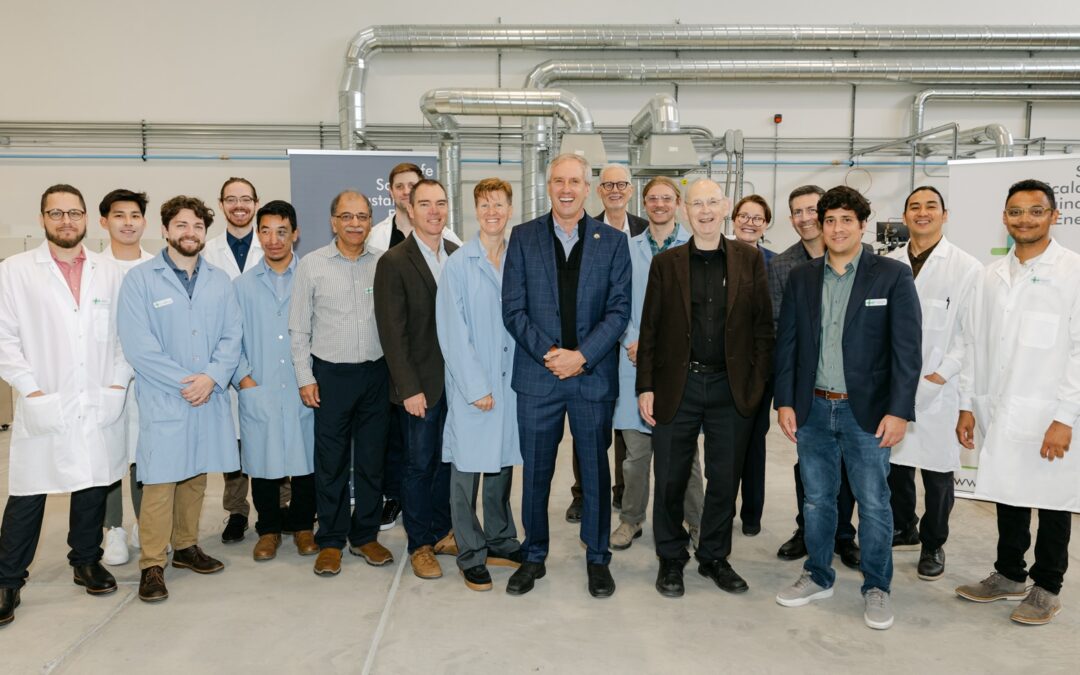
by Enzinc Marketing | Sep 17, 2024 | Press Release
OAKLAND, Calif. – 17 September 2024 – Enzinc Inc., a pioneer in advanced zinc battery technology, opened its state-of-the-art Manufacturing Technology Center in Oakland, California, to meet customers’ demand for the key component that enables them to expand their market and offer high-powered, fireproof zinc batteries for mobility and stationary energy storage. Enzinc makes the critical component for the batteries at the 10,000-square-foot facility.
The opening ceremony was attended by distinguished guests, including the chair of the California Energy Commission (CEC), David Hochschild, a champion of clean energy in the state, and Julie A. Caskey, the director of climate partnerships in the office of Oakland Mayor Sheng Thao.
“This important milestone for Enzinc is an example of public-private partnerships building energy resilience and adding high-quality jobs in America,” said Michael Burz, founder and CEO of Enzinc. “Our success builds on foundational science from the U.S. Naval Research Laboratory (NRL) and is possible because of state and federal grants and support from our investors. As the electrification of buildings, transportation, and the grid accelerates, we need more and better batteries. Enzinc is empowering our customers to meet that demand with safer, more versatile, and cost-effective battery solutions.”
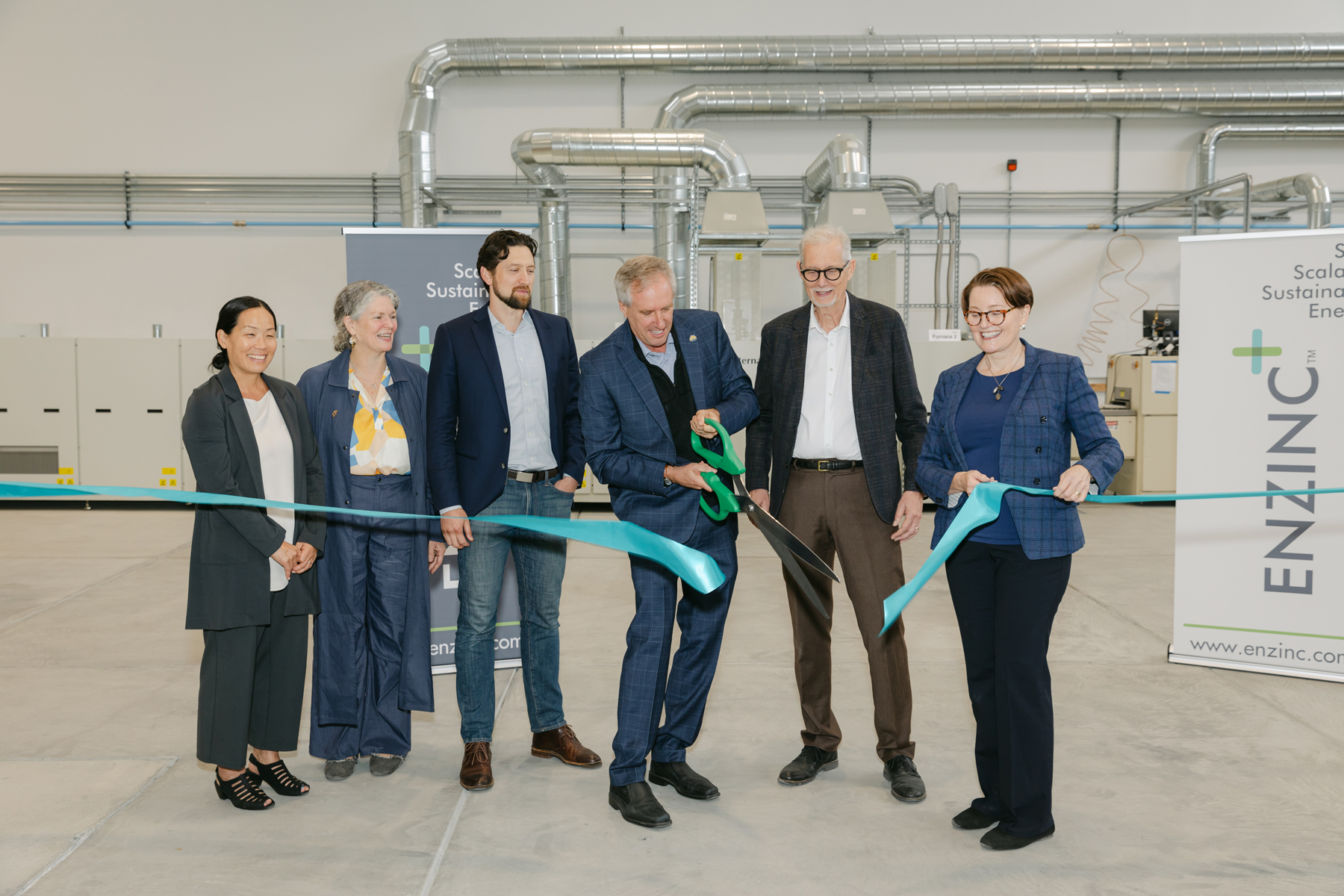
L to R: Rebecca Lee, Managing Director of New Energy Nexus, Julie Caskey, Director of Climate Partnerships in the Office of Oakland Mayor Sheng Thao, Jake Pflaum, Partner, American Century Investments, David Hochschild, Chair of the California Energy Commission, Michael Burz, CEO and cofounder of Enzinc, Deborah Knuckey, cofounder and CMO of Enzinc.
Enzinc is scaling up and automating the production of its innovative zinc anodes at its manufacturing center in Oakland, a hub of innovation and clean energy. The company’s proprietary breakthrough technology is enabling traditional lead-acid battery makers to offer safe, sustainable, and substantially higher-powered nickel-zinc batteries with relatively minor capital-effective upgrades to their existing equipment.
“NRL’s Team Zinc is proud that by architecturally redesigning zinc into the form of a sponge electrode, we thwart formation of zinc dendrites in alkaline batteries,” said NRL Advanced Electrochemical Materials Section Head Debra Rolison, Ph.D. “Solving that impediment to rechargeable alkaline batteries has spurred R&D in zinc-based aqueous batteries, offering an energy-dense future alternative to the safety issues that still arise with lithium-based batteries.” Dr. Rolison stated she was honored to have NRL’s breakthrough acknowledged at the site now set to produce zinc sponges for next-generation, U.S.-manufactured batteries.
“California’s innovation ecosystem supports entrepreneurs who are driving the clean energy transition,” said Jon Bonanno, founder of Factor and a senior advisor to Enzinc. “Enzinc shows how we can develop and manufacture advanced battery technologies when insightful investors support companies that leverage grant programs such as the Department of Energy’s ARPA-E program and the CEC’s Electric Program Investment Charge (EPIC) and draw on California’s depth of engineering talent.”
The zinc microsponge technology, which overcomes the challenge that has historically limited the use of zinc in rechargeable batteries, was recently named by NRL as one of the “25 Technologies for the Next 25 Years.” Batteries with Enzinc Inside deliver the power of lithium-ion batteries at the cost of lead-acid batteries—without fire risks, HVAC requirements, or narrow operating temperature ranges. This groundbreaking technology not only enhances energy storage capabilities but also creates local engineering and manufacturing jobs.
“NRL’s technology transfer program plays a critical role in taking cutting-edge research from the lab and translating it into real-world applications,” said NRL Office of Technology Transfer Senior Partnership Manger Dr. Holly Ricks-Laskoski. “Our program is a robust conduit that enables partnerships between our researchers and industries, bringing scientific discoveries to the forefront of commercial use. This battery technology is a prime example of the types of partnerships we strive to foster, where research meets production, innovation meets practicality, and science meets the marketplace.”
The Manufacturing Technology Center was made possible in part by a $1.8 million grant under EPIC’s BRIDGE (Bringing Rapid Innovation Development to Green Energy) award. With this expansion, Enzinc is making a substantial impact in the energy storage industry, providing scalable and sustainable solutions for a rapidly electrifying world.
________
About the U.S. Naval Research Laboratory
NRL is a scientific and engineering command dedicated to research that drives innovative advances for the U.S. Navy and Marine Corps from the seafloor to space and in the information domain. NRL is located in Washington, D.C. with major field sites in Stennis Space Center, Mississippi; Key West, Florida; Monterey, California, and employs approximately 3,000 civilian scientists, engineers and support personnel. For more information, contact NRL Corporate Communications at (202) 480-3746 or [email protected].
For more partnerships or collaborations, contact the NRL Office of Technology Transfer: [email protected].
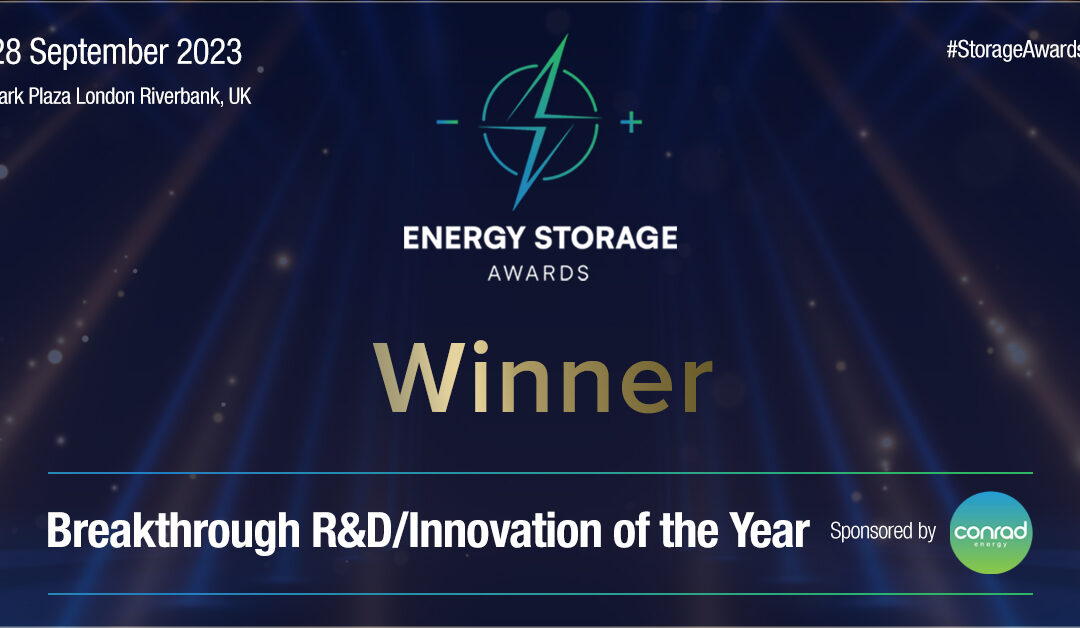
by Enzinc Marketing | Oct 2, 2023 | Press Release
Richmond, Calif. – October 2, 2023 — Enzinc, a pioneering developer of advanced rechargeable zinc battery technology, today announced it is the recipient of the Energy Storage Award for Breakthrough Research and Development (R&D)/Innovation of the Year. This prestigious accolade is a testament to the company’s groundbreaking efforts and contributions to advancing energy storage technology.
The Energy Storage Awards are organized by Solar Media, publisher of the energy storage industry website Energy-Storage.News and host of the Energy Storage Summit series. A panel of 12 judges, comprised of distinguished experts from various sectors of the energy storage field and academic institutions, evaluated nominees for this year’s awards.
“I’m immensely proud of the Enzinc team and this extraordinary achievement, and extend my gratitude to the judges for recognizing the role we are playing in fundamentally reshaping the energy storage arena,” said Michael Burz, Enzinc founder and CEO. “By harnessing the power of zinc, we are driving innovation in energy storage, with the ultimate goal of shaping a sustainable and resilient future.”
Enzinc’s innovation allows zinc-based batteries to deliver unparalleled performance, offering three times the energy output and cycle life compared to traditional batteries. By eliminating battery-killing dendrites, its proprietary zinc anode technology is a game-changer resulting in the creation of superior batteries suitable for both mobile and stationary applications. With Enzinc’s technology at its core, a wide range of applications, from urban electric vehicles to home and grid energy storage systems, can harness the benefits of safe, energy-dense and easily recyclable nickel-zinc batteries.
What sets Enzinc apart is its innovative go-to-market approach – allowing for cost-effective adaptation of existing NiCad, NiMH and lead-acid factories to produce premium batteries infused with Enzinc innovation. This transformation enables these factories to leverage their worldwide manufacturing capacity of more than 400 GWh, effectively tripling their capacity. With this scaling capability, Enzinc and its partners stand ready to meet the ever-growing demand for energy storage solutions, offering a secure, economically recyclable alternative to lithium-based batteries. Notably, zinc, as the fourth most mined metal globally, offers countries a resilient alternative to lithium-dominated supply chains.
Enzinc’s innovative breakthrough is underpinned by the unique attributes of the zinc sponge structure:
- Elimination of Dendrite Growth: Significantly increases cycle life.
- Higher Surface Area: Provides specific energy and energy density equivalent to LFP batteries at the cell level and NMC at the systems level.
- Cathode Agnostic: Can be coupled with nickel, manganese, silver and carbon cathodes.
In recognition of its outstanding contributions, Enzinc has also received several other prestigious awards, including the Keeling Curve Award 2022, the Global Automotive Mobility and Innovation Challenge 2022 from the Society of Automotive Engineers, and the Coup de Cœur 2023 Startup Challenge by the World Materials Forum.
Based in California, Enzinc has received four out of five Electric Program Investment Charge (EPIC) Program grants from the California Energy Commission and, in 2022, closed a $4.5 million seed round led by Portland-based 3×5 Partners.
About Enzinc
Enzinc is a battery technology leader bringing the most powerful zinc-based battery to market. The company’s innovative zinc material enables established lead-acid battery manufacturers to triple their output and substantially improve their margins. Enzinc’s groundbreaking proprietary technology eliminates failure points and mitigates risks in the supply chain, resulting in superior batteries for mobile and stationary applications. Enzinc is based in California and has received awards from ARPA-E and the California Energy Commission to further its battery innovation, and raised a $4.5 million seed round in 2022. Find out more at enzinc.com, LinkedIn, YouTube and Twitter.
PR Contact:
Leah Wilkinson
Wilkinson + Associates
[email protected]
703-907-0010
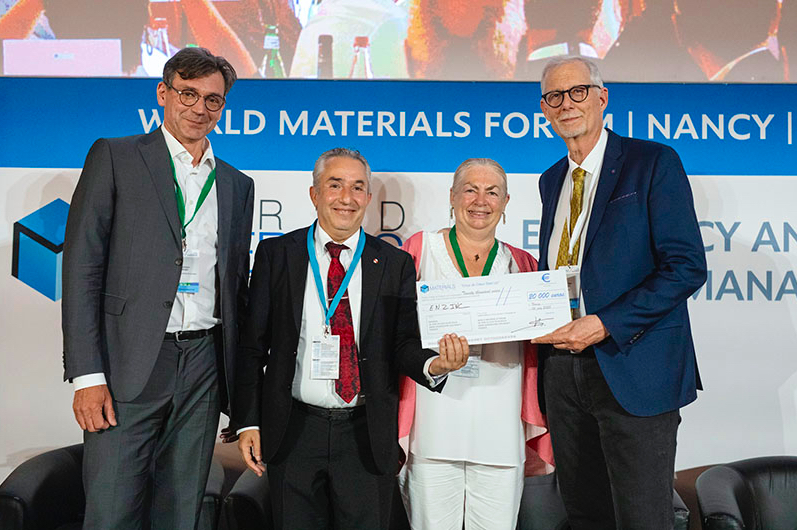
by Enzinc Marketing | Jul 8, 2023 | Press Release
Advanced technology repurposes existing lead acid manufacturing infrastructure to expedite the deployment of better batteries
RICHMOND, Calif.: Enzinc, a pioneering developer of advanced rechargeable zinc battery technology, was awarded the prestigious Coup de Coeur prize in the World Materials Forum (WMF) Start Up Challenge for its innovative way of using a common material to create powerful batteries. A platform for entrepreneurs to showcase their groundbreaking solutions that use materials smarter, more efficiently or longer, the ninth WMF is taking place in Nancy, France, this week. The event brings together industry leaders, experts and innovators from around the world.
The demand for high-power batteries is substantial, but the industry’s growth is hindered by materials shortages. Enzinc is revolutionizing the energy sector by redefining what’s achievable, offering breakthrough zinc battery technology to overcome obstacles and drive progress in the energy storage sector. Its cutting-edge technology surpasses traditional lead-acid batteries by delivering three times the energy output and cycle life and offers twice the energy density of any other zinc battery. Its high-performance solution excels in both mobility and stationary applications.
“We are incredibly honored to receive the Coup de Coeur Start Up Award, a resounding validation of our groundbreaking technology and the unwavering dedication of our team towards fostering innovation,” said Michael Burz, Enzinc founder and CEO. “Enzinc is at the forefront of material innovation, and our drop-in zinc microsponge anode is transforming the battery industry. With Enzinc inside, users can sustainably power anything from short and mid-range electric vehicles to stationary storage systems. Our proprietary zinc battery technology eliminates traditional failure points and supply chain risks, offering superior batteries with higher margins, increased power and enhanced safety.”
The company is positioned to meet the growing demand for battery storage in areas where existing solutions face significant challenges. Considering the limitations associated with lithium, a market valued at $70 billion, and the power delivery shortcomings of lead-acid batteries worth $40 billion, Enzinc’s cutting-edge technology fills the gap and provides a solution for modern applications.
Enzinc has secured four out of five Electric Program Investment Charge (EPIC) Program grants from the California Energy Commission and, in 2022, closed a $4.5 million seed round led by Portland-based 3×5 Partners.
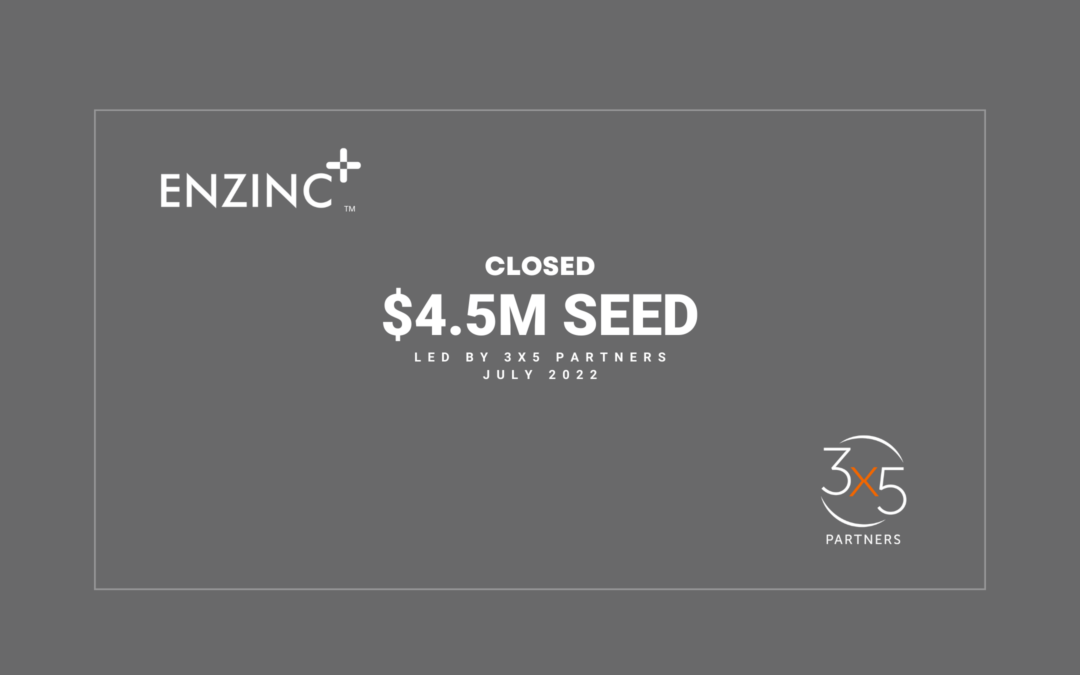
by Enzinc Marketing | Jul 25, 2022 | Press Release
Advanced zinc battery developer Enzinc has closed a $4.5 million seed round led by Portland-based 3x5 Partners.
RICHMOND, Calif.: Enzinc Inc., an advanced zinc battery developer, has closed a $4.5 million seed round led by Portland-based 3×5 Partners. Enzinc was founded with a mission to accelerate the energy transition with safe, sustainable and rapidly-scalable technologies. It is developing high-powered zinc batteries for mobility and stationary uses
“We were as impressed by Enzinc’s business model as we were by its groundbreaking technology,” said 3×5 Partner’s Managing Director, Nicholas Walrod. “Not only are its batteries built using readily-available zinc, solving supply chain issues, but also it will be able to rapidly scale production by leveraging existing lead acid manufacturing plants around the globe.” The team at 3×5 Partners strives to ‘invest in what the world needs’ by partnering with promising companies whose technology offer real solutions in the climate and healthcare sectors.
The capital raise will allow the team at Enzinc to finalize its prototype testing and automated anode production line design for powerful mobility and long-duration stationary nickel zinc batteries.
“It’s crucial that the supply of batteries keep up with the demand coming from electrifying buildings, transportation and the grid. We have to diversify the types of batteries used and not risk betting the whole energy transition on a single chemistry such as lithium ion,” said Michael Burz, founder and CEO of Enzinc. “The team at 3×5 Partners bring a depth of expertise in growing innovative firms, and we are pleased to partner with them.”
Enzinc’s microsponge anode solves the challenges that have limited zinc’s potential as a rechargeable battery material. Batteries manufactured by today’s leading lead acid brands with the ‘Enzinc Inside’ drop-in technology will have the power of lithium at the cost of lead acid, with no fire potential or HVAC requirement and a wide temperature operating range. They will use abundant and recyclable minerals and create local manufacturing jobs, offering superior energy storage for mobility and stationary applications.
The announcement follows Enzinc being awarded $1.8 million under the Bringing Rapid Innovation Development to Green Energy, or BRIDGE, grants through the California Energy Commission (CEC) Electric Program Investment Charge (EPIC) program.

by Enzinc Marketing | Apr 27, 2022 | Press Release
Advanced technology repurposes existing lead acid manufacturing infrastructure to expedite the deployment of better batteries
RICHMOND, Calif.: Enzinc Inc., an advanced rechargeable zinc battery developer, was selected for a competitive $1.8 million California Energy Commission (CEC) BRIDGE award to further develop its zinc batteries for stationary and mobility uses. After approval, the proceeds, along with $1.0 million of matching funds, will be used to design and test a long duration stationary battery and build out a pilot anode manufacturing line.
“If we are to electrify everything, we need batteries that use easily-sourced materials and can be scaled rapidly. Being selected for BRIDGE shows the rising awareness that we can’t place all of our energy storage bets on lithium technologies,” said Michael Burz, founder and CEO of Enzinc. “Today’s $60 billion lead-acid battery market can play a larger role in the energy transition by converting existing factories to use Enzinc’s drop-in technology and make more powerful, higher margin and longer lasting batteries.”
Batteries with Enzinc’s zinc microsponge anode’s safe, non-flammable materials will make it ideal for stationary energy storage inside homes and commercial buildings and adjacent to critical energy infrastructure. Additionally, it will be ideal for mobility including e-bikes, e-scooters, electric delivery vehicles and other electric vehicles with moderate ranges, as well as be able to replace the lead acid battery that all vehicles use for starter motors and other systems.
“The EPIC programs available at each stage of a clean energy company’s development and commercialization are creating a vibrant and innovative industry in California,” Burz said. “We are honored to have been a recipient of these vital awards at key points in our company’s growth and to be selected for BRIDGE.”
The Bringing Rapid Innovation Development to Green Energy, or BRIDGE, awards are funded by the Electric Program Investment Charge (EPIC) program, which will grant up to a total of $57.3 million over four rounds. Enzinc and four other companies were selected for the proposed final round of funding, contingent on final approval at a CEC business meeting.
Previously, Enzinc has received CalSEED Phase I and II awards, together worth $600,000, and a $292,000 CalTestBed voucher for product testing. The selection follows Enzinc’s announcements that it has formed an Industry Advisory Group with global leaders in battery production, use and recycling, and that it won the Global Automotive and Mobility Innovation Challenge, GAMIC, at the SAE International World Congress Experience.







